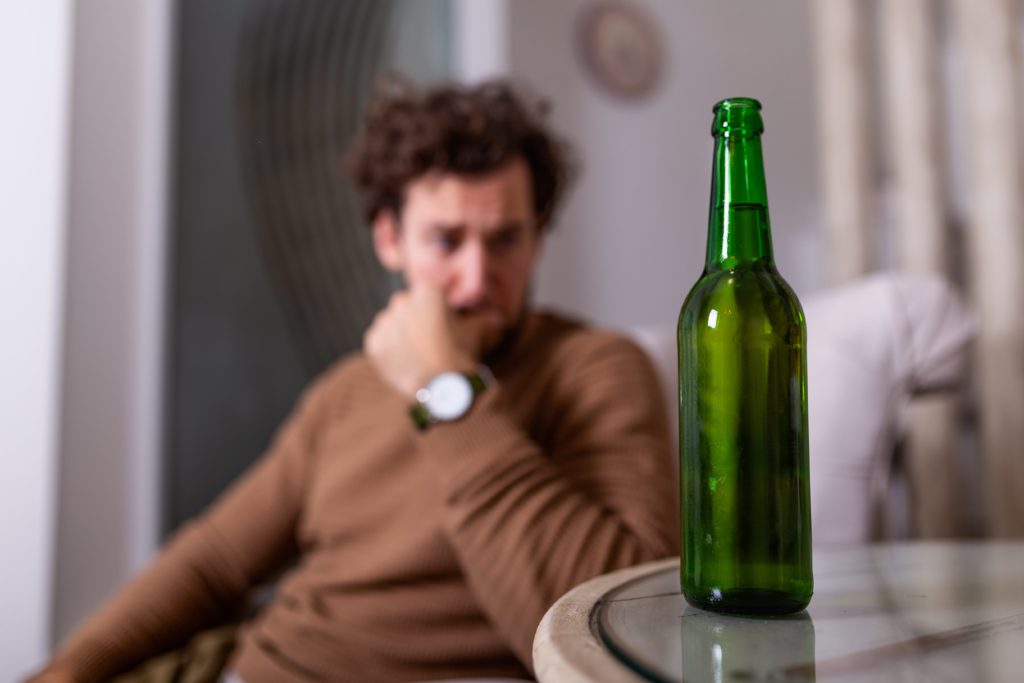Being active in addiction ingrains many negative trains of thought, attitudes, feelings, and actions. Simply removing alcohol or drugs without changing these underlying factors is likely to produce ‘dry drunk syndrome.’ Dry drunk is a slang expression infamously known in the sober community. It describes a person who no longer drinks or abuses drugs, but continues to behave in dysfunctional ways. Thus, dry drunk syndrome is essentially untreated alcoholism or substance use disorder, as the person is not really addressing the issues that caused their substance abuse in the first place.
What is a Dry Drunk?
The syndrome is best described as someone who fits one of two conditions:
- A person with chemical dependency issues who has given up alcohol and drugs, but made no internal emotional or behavioral changes. Essentially, the only difference in these individuals is the absence of a substance. The popular analogy in recovery is, “…if you sober up a horse thief, what do you get? A sober horse thief.”
- A person with chemical dependency issues who is currently abstinent yet regressing in recovery. This may include little/no 12-step meeting attendance, minimal/no active sponsor relationship and little/no involvement in 12-step fellowships. Sober alcoholics and drug addicts in this category will likely begin exhibiting negative thinking, isolation behavior and a general uneasiness/restlessness with life.
It is important to recognize regression to old ways of thinking and acting, or lack of progression on the road to recovery. Another catchphrase used in the sober community is “untreated alcoholism.” Both terms refer to the same symptoms, and these dangerous conditions traditionally mark the initial stages of relapse.
The big book of Alcoholics Anonymous describes dry drunk syndrome and untreated alcoholism with the phrase “restless, irritable, and discontented”. Basically, if you happen to be a sober alcoholic or addict, and find yourself consistently dissatisfied with life, you may be in the thick of untreated alcoholism/addiction.
Another way of looking at the dry condition rests in the two distinct dangers it presents those on the road to recovery:
- Negative attitudes and mental postures that return or redevelop in a person who has not worked on underlying emotional issues or behaviors. These symptoms start to impact quality of life in harmful ways.
- If left unchecked, relapse or some other serious event, in some cases suicide, can occur.

5 Common Attitudes of Men With Dry Drunk Syndrome
Here are five common attitudes and mental postures common among men with dry drunk syndrome:
#1. The Dry Drunk May Display Superiority
Superiority or grandiosity basically means a return to a self-centered, ‘the world revolves around’ me attitude. Chemically dependent people are self-centered in the extreme, as any therapist or psychiatrist is quick to observe.
With grandiosity, you are setting yourself up to be the center of attention; either superior to everyone around you, or by playing the victim. Either way, you’re distancing yourself from the people and world around you. What you’re really saying is ‘I am not like you’ with the implication that rules don’t apply in my particular case.
In 12-step programs, this is commonly known as ‘terminal uniqueness,’ or the belief that I am so unique, no one could possibly understand or relate to me. Self-pity or superiority characterizes this mentality. Unfortunately, those of us in recovery find that the only thing we ever got from sitting on the ‘pity pot’ was a ring around our butt.
#2. The Dry Drunk May Display Impulsivity
One of the most common attitudes or observable behaviors of people with addiction problems is poor impulse control and impatience. We tend to do what we want, when we want, with little regard for self-harm or the hurt caused towards others.
When impulsivity is combined with grandiosity, attention-seeking behavior accelerates to warp speed. Warped expectations that characterize virtually every alcoholic and drug addict feed this impulsiveness. Chemical dependency instills a taste for immediate relief. Years of alcohol and drug abuse almost mold it into addiction’s nature.
I heard the phrase “time takes time” so often in early sobriety that I wanted to punch something. Ironically (and unbeknownst to me at the time), this frustration was a manifestation of impulsiveness.
#3. The Dry Drunk May Display Negative Judgment
This may be one of those most destructive mental aspects of addiction. According to the big book of Alcoholics Anonymous, this unfortunate addiction characteristic is like a man who looks at a beautiful forest and points out the only dead tree. Alcoholics and addicts tend to exhibit particularly negative perspectives about themselves, others and the world about them.
When we, as alcoholics and addicts, judge a person as being ‘better than or less than,’ we are creating a situation where we manipulate our internal condition in much the same way a drink or drug functions. On the other hand, if we judge ourselves or others as ‘falling short or less than,’ we can feel bitter and cultivate resentment.
In both cases, people with chemical dependency and untreated alcoholism are at risk of separating themselves through mental isolation. By negatively contrasting ourselves or the outside world, we invite regression in recovery. This is another reason why drug addiction and alcoholism are commonly referred to as mind-powered diseases.
#4. The Dry Drunk May Display Complacency
This is not only an attitude of somebody in dry drunk syndrome, but is a red flag warning sign of someone who dangerously treading the path to relapse. An important facet of being in active recovery is just that – being active. It does not matter how quickly an alcoholic or drug addict progresses, just that progress is being made. It is easy to regress into laziness or disinterest, usually with a return to addictive behaviors.
Once lured into these attitudes, thinking begins to tread on choppy waters. This twisted thinking invites destructive, self-centered thoughts. And there’s an excellent chance these thoughts and thought processes will inform an alcoholic or drug addict’s actions in negative ways.
I look at my sobriety and recovery as being always on the move. I am either moving toward a drink and drug or away from a drug and drink. The key is that, left alone and not progressing in recovery, the prospect of a drink or a drug quickly grows. It’s like parking a car on a hill, and sooner or later, the brakes will give out while the car tumbles to its demise.
But I wonder if complacency is in fear rather than laziness. Am I afraid of success? Am I afraid of failure? Am I sitting around waiting for things to work out the way I want them to without putting in the necessary effort? Unless I find the willingness to meet these fears with the tools of recovery, my sobriety is tenuous at best.
#5. The Dry Drunk May Display Negativity in General
I was guilty of this for quite some time in my recovery. I kept asking myself when good things would come to pass, always neglecting to recognize some positive events that had already transpired.
If negativity sets in, it is very important to determine if any underlying issues are present. What’s going on beneath the surface? Is it anger and resentment, or is some person, place or thing not working out the way you expect? Is excessive anxiety and worry beginning to creep into various threads of life? In these situations, a sober alcoholic/drug addict should work closely with a sponsor, and if necessary, a licensed medical professional.
One of the most futile emotions is anxiety because your focus tends to shift towards future events. I don’t know anyone who can genuinely foresee future events; even Nostradamus had problems with a crystal ball. High stress consumes mental energy. It is virtually impossible to retain feelings of happiness and serenity when anxiety permeates life.

8 Destructive Behaviors From ‘Dry Drunk’ Thinking
Here are eight destructive behaviors and actions that can result from the dreaded dry drunk thinking:
#1. We become restless, irritable and discontent
Little things start to annoy us. We start to look for differences in those around us, which causes separation. If you remember, this is the first stage in the relapse process. It is also the trickiest because we often fail to recognize that ‘separation mentality’ is present.
Without a support system of trusted people around us, a world of trouble awaits. The people we associate with in recovery may offer their concern, feedback and direction. This is given out of love, not out of spite. It is important to open our ears and listen, despite feeling singled-out.
#2. We become bored or dissatisfied
We are easily distracted from productive tasks. I visualize this as having the electrifying vigor of recovery diminish to a small spark. Nothing excites us anymore. The “pink cloud” is over. Our initial euphoria is replaced with disillusionment.
We may start to wonder why we got sober in the first place. This is an ideal time to start a gratitude list under a sponsor’s guidance. If we become unable to see the progress we’re making in recovery, or we start taking it for granted, it is easy for sobriety to lose top priority.
It is my belief that for those in long-term recovery, complacency is the biggest demon we must fight. On the flip side, I believe the most viable asset one can have in recovery is persistence. When life gets rolling along and things seem to be working well, the temptation is to lose focus on growing in recovery.
Many sick people stop taking medication once they start feeling better, only to see illness reemerge. The same principle holds for those on the sober path. Don’t stop taking the medication offered through recovery.
#3. Our emotions and feelings either get listless and dull or we start overreacting.
Either we become emotionally dull, or we catapult into hyper-emotionalism. Our reactions are not proportional to the events. Maybe an everyday occurrence results in seething anger, or a simple comment from a coworker causes a war of words.
At this point, it’s a good idea to seek emotional support or feedback from trusted members of the sober community. Let’s face it, recovery and life offer ups and downs, peaks and valleys. These situations can be amplified in the absence of an anesthetizing substance, but we must meet life’s turmoil with the tools learned in recovery. In some situations, however, pain can be an incredible motivator. In the absence of pain, change is usually non-existent.
#4. We start to engage in ‘euphoric recall.’
Euphoric recall is a real fancy way of saying we only remember the good times. We remember how much fun we had when using, how much more social, clever, witty and awesome we were. It really is a journey into the past’s fantasy land.
At the same time, we also choose to ignore all of the misery that resulted from alcohol and drug abuse. We tend to forget the times where we made a total fool of ourselves at parties or social events. Perhaps we ignore memories of legal troubles.
An objective inventory can put a stop to euphoric recall quickly. Simply sit down with a piece of paper and write two columns, one for the good times and one for the bad. Most alcoholics and drug addicts will have a laundry list of negative consequences. Remember them.
#5. We start to engage in magical thinking.
We get unrealistic with magical expectations and fanciful dreams. This characteristic is similar to euphoric recall, but not necessarily confined to past events. Magical thinking can involve unrealistic expectations, unreasonable goals, and simply believing that things will occur if we wish for them hard enough.
One example might be thinking that if I stay sober, my girlfriend will come back to me. Or maybe… I’ve been good so long, one drink won’t hurt. My personal favorite is the following sentence: ______ (Drugs/Alcohol) wasn’t my problem, it was __________ (my job, my husband, my wife, my anxiety, etc).
If you find yourself traveling down Magical Thinking Avenue, reach out to trusted, sober friends. Talk with your sponsor. I can assure you, a Powerball win is probably not in your future.
#6. We lose interest in self-improvement.
There’s a fine line between becoming peaceful and becoming complacent. What happened to all those plans for a ‘new you?’ Instead of doing more walking the walk, we start talking the talk. The ‘action’ part of the program disappears, and we lose momentum built over days, months or years in recovery. We become content to sit back and let other people do the work. This condition usually doesn’t last long, as people either recapture the motivation to apply recovery-related actions or relapse.
#7. We start to become unfulfilled.
As a result of any combination of the points already discussed, a feeling of not having our dreams fulfilled can takeover. Many sober folks have this notion that mere abstinence will solve all problems.
Don’t get me wrong, sobriety is definitely a step in the right direction; however, there is a good chance that wreckage of the past will take time to heal and resolve. This starts to move into the realm of having unrealistic expectations. We want things to happen quickly. But, without action and continual self-improvement, not much will change.
#8. We start acting on old defense mechanisms.
We begin to think in terms of old attitudes, and now we’re acting on them. The walls, supports and barriers erected to support drinking and drugging are refurbished with a fresh coat of paint. Minimize problems. Rationalize problems. Deny problems. I’m bulletproof. I got this, and all that sober mumbo-jumbo is for the birds. I’m doing quite well without it, thank you very much.

What to Do About Untreated Alcoholism
Untreated alcoholism, and the problems connected with it, is one of the most significant public health issues in the U.S. Fortunately, no matter how severe the problem may seem, most people struggling with their untreated alcoholism would benefit from some form of treatment.
Most people tend to think of alcoholism treatment as some form of 30-day rehab or participation in a 12-Step program. However, a wide variety of treatment methods are available, thanks to significant advances in the field over the past few decades. These treatments include behavioral treatments like individual and group therapy, medications that have been approved for the reduction of withdrawal symptoms, and mutual support groups like Alcoholics Anonymous (AA).
The treatment of alcoholism starts with a consultation with one’s primary care physician (PCP). For those considering treatment, talking to a PCP is an important first step, as they can provide appropriate referrals and medications. A PCP can also evaluate a patient’s drinking pattern, craft a long-range treatment plan, and evaluate the patient’s overall health, including mental health. In this way, untreated alcoholism can be treated and managed.

Help for Untreated Alcoholism in Nashville, TN
Looking back at the list of attitudes and the actions dry drunk syndrome can generate, it is easy to see how this condition is nothing more than a regression to thoughts and behaviors exhibited during active alcoholism and drug addiction.
If you are starting to notice some of the attitudes discussed creeping back into your life, it is time to start paying attention to the possibility of relapse and start turning your life in sobriety around. Dry drunk syndrome can be a harbinger of relapse. Don’t let it take your recovery. And if you need help, contact Discovery Place today.

